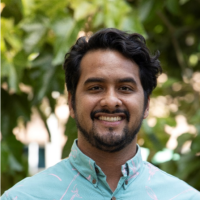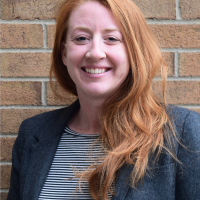Postdoctoral Fellows
Emma Amissah, PhD
Emma is a public health physician. She earned her medical degree from the University of Ghana Medical School, her MPH from the Rollins School of Public Health, Emory University, and her doctorate from the University of Auckland in New Zealand. Her doctoral dissertation, “Early life nutrition and long-term health outcomes,” assessed the effects of early-life nutritional interventions on later developmental, cardiometabolic, growth, and feeding outcomes in infants and animals. She served the United Nations Mission in Haiti soon after the 2010 earthquake and the UNDP/UNV in Trinidad and Tobago. Her research interests lie broadly in understanding the mechanisms relating early life exposures to later adverse health and designing appropriate mitigating interventions and policies. At Columbia, she will explore the epigenetic and microbiome mechanisms linking early life environmental exposures (phthalates, disinfectants) to later health.

Ilan Cerna-Turoff, Phd
Ilan received a PhD in Epidemiology and Public Health from London School of Hygiene and Tropical Medicine in 2020. He has over a decade of experience in child protection and health, with a focus on low- and middle-income countries, marginalized groups, and humanitarian settings. Ilan received a Fulbright Research Grant and Haruv Student Research Award for his past work. His doctoral research applied quantitative methods in analyzing violence in low resource settings and causal approaches in measuring the relationship between natural hazards and violence against children. Ilan's current research at Columbia investigates longitudinal exposure to natural hazards, subjective wellbeing, and violence in childhood. His work combines traditional statistical methods and machine learning. He has an interest in ecological exposures, health, and applied statistical methods.
![]()
Mariah DeSerisy, Phd
Mariah completed her PhD in clinical psychology at Fordham University in 2021. She graduated from Trinity University in Texas in 2014 where she double majored in neuroscience and psychology. After graduation, she joined the Mental Health Interventions and Technology (MINT) Team in Miami, Florida at Florida International University as the research coordinator. In graduate school, Mariah focused on understanding behavioral, cognitive, and neurobiological risk and resilience factors for emotion dysregulation (irritability and anxiety) in children and adolescents. Clinically, Mariah specializes in providing evidence-based treatments for children and families struggling with severe emotion dysregulation, trauma, and high-risk behaviors (e.g., suicidality, substance use, non-suicidal self-injury). Mariah’s current research interests include intelligence in typical development, the impact of environmental and social exposures on risk for childhood psychopathology, and neurobiological correlates of irritability and anxiety.
![]()
Christian Dye, PhD
Born and raised on the island of Hawa’i, Christian Ka’ikekūponoaloha Dye is a kanaka maoli, or Native Hawaiian, epigenetics researcher with an interest in cardiometabolic diseases in underrepresented populations, such as Indigenous Peoples. Christian attended the University of Hawai’i at Mānoa where he obtained a bachelor’s degree in biology. Soon after, he would start his graduate education at the University of Hawai’i at Mānoa in the Department of Molecular Biosciences and Bioengineering. Here, Christian's doctoral research focused on identifying epigenetic signatures in leukocyte subpopulations across a spectrum of diseases, including insulin resistance, diabetes, and dementia, and various populations, including Native Hawaiians, Japanese Americans, and HIV infected communities. At Columbia, under the direction of Dr. Bacarreli, Christian's research focuses on utilizing epigenetic information, such as DNA methylation and non-coding RNAs, to identify potentialy mechanistic biomarkers that may explain the relationship between environmental exposures and cardiometabolic disease risk in underrepresented communities, including American Indians. Christian hopes his research will be instrumental in developing novel strategies for disease diagnosis, prevention, community interventions and targeted therapeutics. As a kanaka maoli, Christian has been a first-hand witness to the chronic diseases that plague his people. By bridging his previous and current research training, Christian plans to develop inclusive community-based research that utilizes epigenetic information to examine the relationship between community-level health and individual cardiometabolic health in underrepresented communities, such as Native Hawaiians and other indigenous peoples, with the hopes that his research will be translatable to other underrepresented, and often at-risk communities.
![]()
Abby Gaylord, PhD
Abby Gaylord received her PhD in Epidemiology from the NYU School of Medicine in 2022, where she worked with the Department of Environmental Pediatrics on several projects using data from the NYU Children’s Health and Environment Study and other birth cohorts. Her dissertation work focused on cord blood methylomic and transcriptomic signatures associated with prenatal exposure to endocrine disrupting chemicals. Prior to attending NYU, Abby earned her MPH from the EHS department at Mailman and a BS in pharmacology from the University at Buffalo. Her postdoctoral research will continue to examine biomarkers of prenatal and early childhood exposures and adverse health outcomes in childhood under the advisement of Drs. Allison Kupsco, Andrea Baccarelli, and Julie Herbstman.

Gabriella Meltzer, Phd
Gabriella received her PhD in public health from NYU School of Global Public Health in 2022, where she was primarily affiliated with the Center for Public Health Disaster Science. Her dissertation examined the adverse consequences of child and adolescent exposure to the Deepwater Horizon oil spill in the context of cumulative environmental and family stress. Prior to her doctoral studies, Gabriella received her bachelor’s degree in Health and Societies from the University of Pennsylvania and was a global health research associate at the Council on Foreign Relations. Under the advisement of Drs. Pam Factor-Litvak and Joan Casey, she will continue to research how community-level environmental exposures create and exacerbate health disparities at critical and sensitive periods of the life course.

Katlyn McGraw, Phd
Katlyn graduated from the University of Louisville with a PhD in Environmental Health Science in 2021. Katlyn’s research focuses on exposure to underregulated pollutants and their contribution to heart disease, in particular metals, volatile organic compounds, and benzene. Before beginning her graduate career, she worked as a bench chemist in hazardous waste recycling and radiopharmaceuticals; and as a clinical research associate at Norton Healthcare. In 2018, Katlyn was invited to intern with the Environmental Defense Fund in Houston, Texas to study benzene pollution after Hurricane Harvey, and last year she was awarded the KC Donnelly award to collaborate with the Columbia University Superfund Program to assess mixtures of environmental pollutants. Her award led to her current postdoctoral fellowship. Katlyn is a proponent of actionable research to impact policy. In her free time, she is an avid reader, cyclist, and active member of the LGBTQ+ community.
![]()






